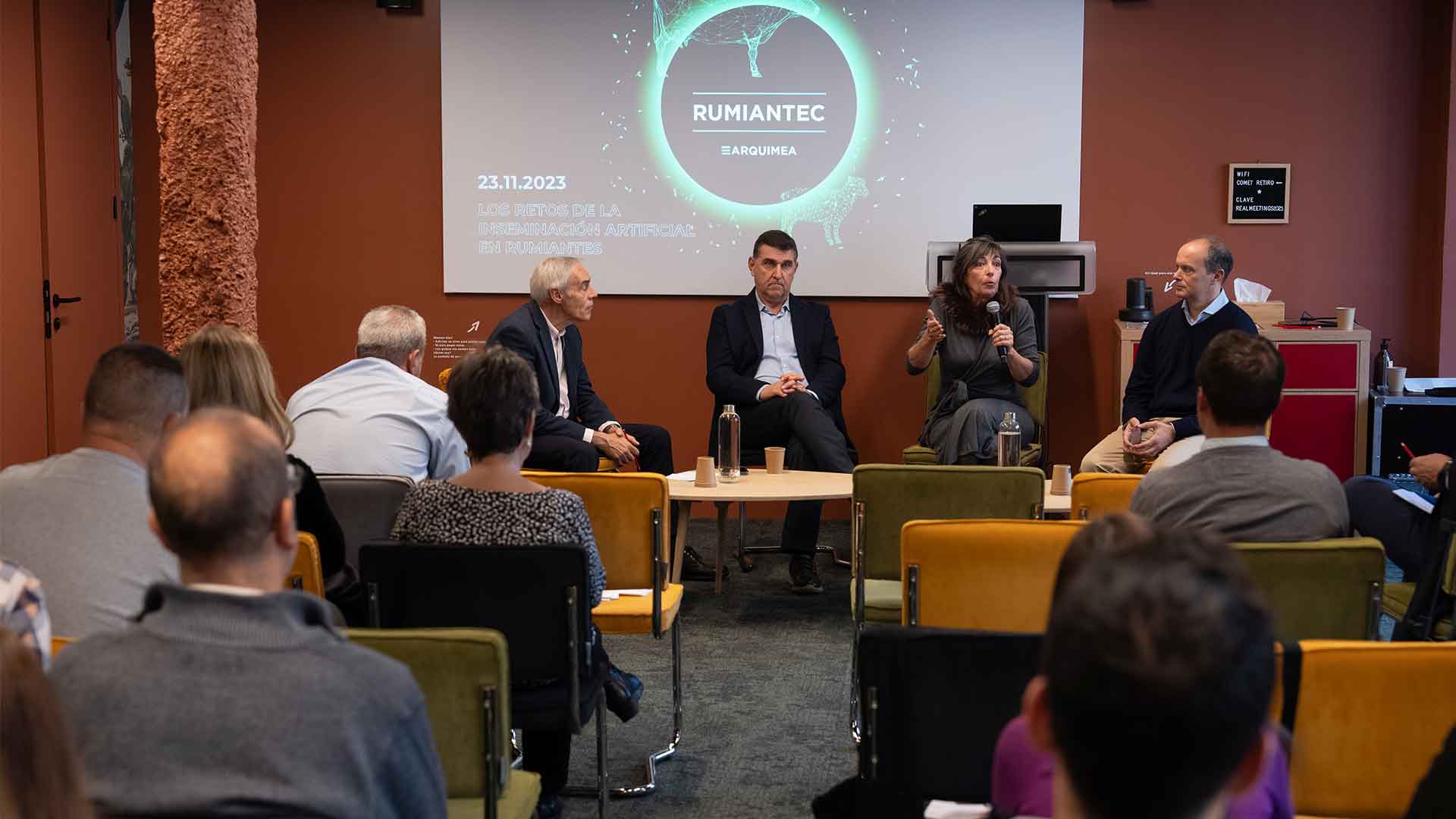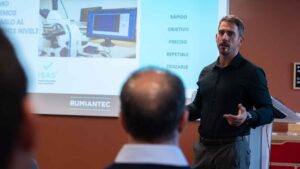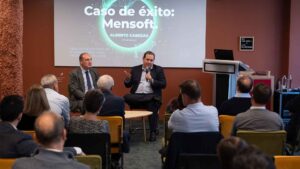- Sectors
- Aerospace & Defense
- Big science
- Biotechnology
- Fintech
- Work at ARQUIMEA
- Insights

Last November 23rd at it’s RUMIANTEC congress, the technology company analyzed the latest developments and treatments in seminal analysis, which was highlighted by the panel of renowned experts in this field. From INIA-CSIC researchers to private companies such as OCEVA or Aberekin showed their vision and the latest trends in the sector.
ARQUIMEA, from it’s agri-food area, held last November 23rd RUMIANTEC, a technical congress that brought together experts in artificial insemination in ruminants, with the aim of exploring the current challenges that this industry is facing.
The congress, held in Madrid, addressed through different presentations, round tables and interviews the latest advances, trends and challenges in the analysis and conservation of semen from small and large ruminants, as well as different applied technologies to improve the accuracy and speed of the analysis process.
The first block ‘The challenges of artificial insemination in ruminants’ was led by renowned experts in this field, both in the public and private sector. Sonia Pérez Garnelo, senior researcher at INIA/CSIC, opened the congress by presenting a detailed analysis of traditional seminal quality control tests; the pros, cons and underused parameters of CASA systems and the problem of different analysis results between different laboratories.
Adolfo Toledano, also from INIA/CSIC, offered an essential perspective on cryopreservation, addressing control parameters, semen extenders, additives and systems for frozen semen quality. Toledano also emphasized the importance of the timing of sample collection to ensure proper preservation.
Manuel V. Morales Gamazo, founder, president and beef specialist at OCEVA, focused on epizootic hemorrhagic disease (EHD). He began by detailing the current situation in Spain, in terms of the number of outbreaks in recent months and animals affected, highlighting the current lack of knowledge about the disease and the difficulty of treatment on farms. Morales ended his presentation with a series of recommendations on biosecurity and action protocols to prevent the transmission of the disease.
The block ended with a round table discussion, moderated by Carlos Ugarte, CEO of Aberekin, with the participation of Sonia Pérez Garnelo, Adolfo Toledano and Manuel V. Morales. It allowed an exchange ideas about the evolution and current issues in the sector, providing a more complete view of the challenges and opportunities facing the industry.

The second block ‘Automation and artificial intelligence applied to seminal analysis’ was in charge of ARQUIMEA to highlight the latest technological trends applied to animal reproduction. Pablo Fernández, veterinarian in charge of product development at ARQUIMEA, delved into the possibilities of artificial intelligence to optimize the insemination process in ruminants, highlighting its advantages and how they deal with the limitations of this technology. He also presented their automatic robotized CASA system for ruminants, where they have already applied AI to make it much faster and more precise.
This second block culminated with a demonstration of it’s ISAS PRO analysis system, where attendees were able to see for themselves the improvements of this automatic system compared to manual systems in terms of speed, objectivity and traceability of results.

The third block of the morning ‘Alternative ways of financing R&D&I projects’ explored the opportunities of Tax Lease to finance research projects. Rafael Espinosa, director of R&D&I project financing at Kaudal, ARQUIMEA’s fintech area, explained to the attendees the benefits of this novel tax tool and how to apply it to obtain financing of up to 35% of R&D&I project expenses.
To conclude RUMIANTEC, Kaudal, which has already mobilized more than 420 million euros in R&D&I projects, showed with the help of Alberto Cabezas, CEO of Mensoft, how they have already put this financial-fiscal instrument into practice.
In short, ARQUIMEA provided a unique technical platform for the exchange of knowledge and experiences among ruminant animal reproduction professionals. The assisted reproduction sector faces new challenges; however, companies and research centers continue to advance in innovative solutions to meet the challenges of this industry.